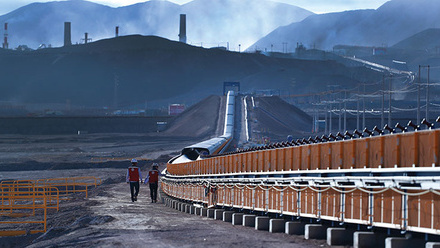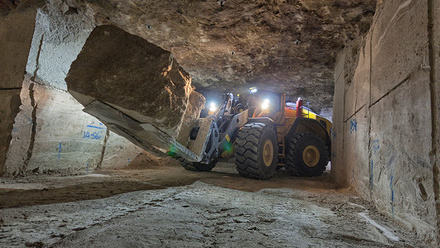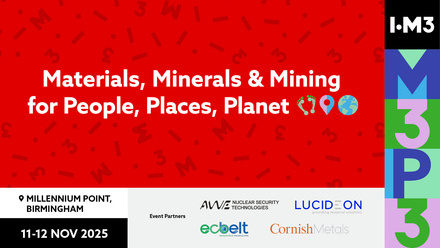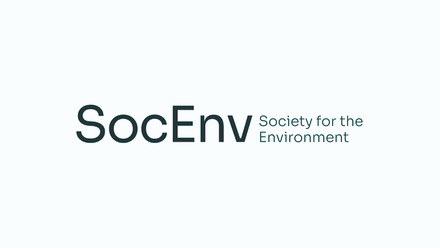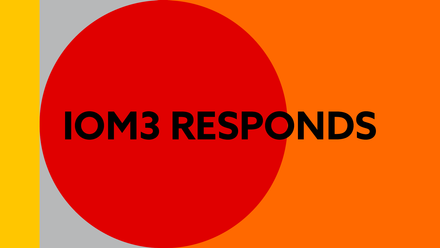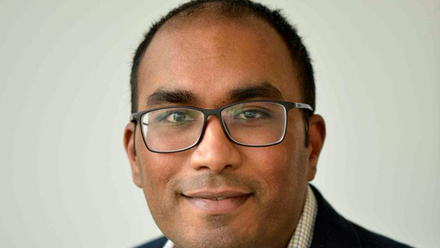At the cutting edge of mining
Catching up with Lucy England MIMMM on 25 years in mining.
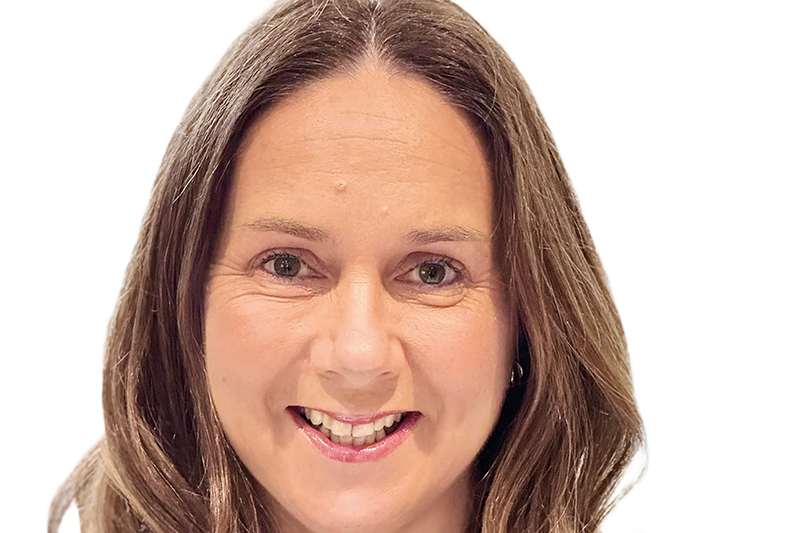
Raised on a small farm between Camborne and Redruth, in the tin-mining heartlands of Cornwall, it is rather fitting that Lucy England MIMMM should pursue a career extracting and processing metals and minerals.
One of her earliest memories is playing around the Wheal Basset Mines and Stamps, now on the heritage cycle path near Carnkie, but the shafts were uncapped when she was a youngster.
'We used to throw small stones down the mine shafts and count to see how deep it was,' she recounts. “Mining to me was normal. You were either a miner or a farmer.'
Although she only accepted an offer to study a BEng in Minerals Engineering at the University of Exeter’s Camborne School of Mines through clearing, her route to the degree and subsequent career suggests destiny had a hand in the direction she took.
She credits her boarding school, Truro High School for Girls, for encouraging its students to pursue studies beyond traditional female interests – in her case a fascination with science and scientific experiments. As England reflects, she was 'firmly down the STEM route at an early age'.
She took single Sciences and Computing at GSCE, followed by Chemistry, Physics and Biology A-Levels and an AS Level in Computing.
Blazing a trail
Out of the six people who graduated from her undergraduate degree in 1999 (15 had started), four were women.
And the fact that she has risen quickly through the ranks at her current employer – Danish technology innovator FLSmidth – which she joined in 2001, is proof that women can thrive in what is still perceived to be a male-dominated industry.
By her own admission, she’s not encountered any significant hurdles as a woman in the sector across a career spanning nearly 25 years. Even so, she laughs when she recounts how surprised some customers have been when she has turned up onsite, despite knowing her name is Lucy!
'Although they’re surprised, as long as you’ve been able to deliver successfully and understand your subject, I have found the industry has been quite welcoming and even intrigued as to why you’re doing this.'
Having said that, England feels it is still the case that women must prove themselves more than men before they are promoted.
Considering why women in technical roles struggle to ascend to the boardroom, she suggests this may be because these individuals prefer to continue down a technical path. To progress to the boards, 'you have to go into management'.
This final point has broader significance. England stresses the importance of having someone with technical knowledge and experience in the boardroom informing strategic decisions.
'A technical lead should be on the Board to understand sustainability and mining processes,” she explains. “Board members should have diverse skills, and I would like to see more female technical board members.'
Little and seismic change
In some respects, England feels the mining industry has evolved little from the one she entered at the turn of the millennium. Efforts to reduce water usage and improve acid mine drainage, for instance, were already indicators of a shift to inculcate more responsible and sustainable practices.
In other respects, however, there has been a tectonic shift. 'We definitely weren’t discussing innovation and creating new technologies to cut CO2 emissions and combat global warming in the early 2000s,' she notes. 'The current focus is much more on achieving sustainability with enhanced environmental stewardship and responsible mining practices.'
She says mining’s evolution has been driven in part by increased regulatory pressures alongside societal expectations. Significantly, there has also been growing recognition among industry players that sustainable practices don’t just benefit the planet, they also underpin the long-term viability of mining operators.
In her two-decade-plus career with FLSmidth, it is therefore understandable that England has also expanded her horizons and diversified her experience.
Even so, she cites her first position – as a Test Work, Pilot and Commissioning Engineer – as arguably the most pivotal role, because it enabled her to achieve the career high she has now reached.
'Nothing makes you learn quicker than when you’re commissioning a plant – things go wrong, and you must fix them, there and then,' she reflects.
'To me, hands-on learning is really where that knowledge implants itself in your head. Possessing problem-solving skills is beneficial when designing new equipment and conducting research, as it provides an understanding of how things react, respond and work.'
This introductory role not only shaped her entire career, it also piqued her interest in research and a desire to make equipment safer and more productive, she adds.
MissionZero
In her current role, which she took on in October 2021, England oversees FLSmidth’s MissionZero programme. She is responsible for guaranteeing the equipment and flowsheets developed align with the strategy of eliminating water and energy waste, and emissions by 2030.
'This shift reflects a broader industry change where the focus has expanded beyond mere extraction to include the entire lifecycle of mining operations,' she explains. 'We are integrating advanced and digital technologies with innovative processes to minimise the environmental impact, while maximising resource efficiency.'
Her day-to-day work includes assessing the merits of new technologies for different crushing, grinding and separation processes, such as flotation, coarse particle flotation, high-pressure grinding rolls and vertical roller mills.
'We combine all of the most efficient technologies together for different commodities to create the most sustainable mineral processing flowsheets possible, and that often depends on the mineralogy, the hardness and the properties of the ore,' she explains.
After advancing the new technologies to a readiness level suitable for commercial sale, England will then present these technologies to customers by showcasing their efficiency in reducing energy consumption and CO2 emissions. Also, where applicable, she will demonstrate their improved recovery capabilities and recycling of wear parts.
'This is probably my favourite role within the company so far,' she admits. 'Enjoyment-wise and in terms of making an impact, I feel I’m making a greater difference than I did in my early days.'
Overcoming challenges
At an IOM3 panel debate this summer that explored what’s next for the mining industry, one of the main challenges discussed was the difficulty in attracting investment, notably for UK operations.
For England, the answer lies partly in promoting responsible and sustainable practices to reshape public perceptions – often clouded by negative legacy issues – so society is more receptive to fostering sectoral growth.
She also feels this approach must be backed with a strong regulatory framework to drive compliance and attract investors. Government has a critical role, she sees, in making sure 'mining legislation is up to scratch' and reducing permitting times.
'It comes down to education and transparency', she says on creating favourable conditions for investment.
'Mining practices must be strictly regulated and governments should be lobbied to enforce stringent governance, showing the public that modern mining can be clean, responsible and environmentally friendly.'
Referring to the tin mining industry she observed growing up in Cornwall, she notes it is also critical to consider the entire lifecycle of any future mining projects. This is to ensure that, once mining engineers have fulfilled their brief, the operation is returned, either as an asset to the local community for alternative uses, or the landscape as it was before the project started.
'We need to demonstrate that mining can be beneficial to local communities,' she explains, pointing to how deprivation levels soared in Redruth when tin mining went into sharp decline.
'There needs to be a reassurance that, even after the mine is gone, there are going to be processes in place that mean mining communities don’t just come up on a 10-year high and then crash back down again. Where there is a mine, there are all the surrounding industries that support that mine providing additional employment, investment and growth. There needs to be a strategy for the entire community reliant on the mine.'
At an international level, England argues that the International Council of Mining and Metals (ICMM) has a critical role in promoting best practice, citing the Global Industry Standard for Tailings Management and the 2022-24 Strategy and Action Plan.
The body also wields great influence uniting a third of the global metals and mining industry, with key partners to promote leadership, action and innovation for a safe, just and sustainable world.
Having experienced mining operations across many diverse countries throughout her career, one of the biggest negatives she sees is the different levels of legislation that exists between countries. Again, this is where she argues ICMM has a role in promoting common global standards of governance.
England observes how geopolitical tensions are fostering innovations in mining and funding for the sustainable production of critical metals required for the green transition. Additionally, countries are now more focused on using their own mineral resources.
Drawing on her global experience, England feels the UK doesn’t need to look far to learn lessons from superlative practices in responsible and sustainable mining, citing European operators like Boliden and Somincor.
The former pioneered the implementation of electric trucks in mining operations, slashing CO2 emissions in the process, she says, while the latter transitioned to surface paste disposal of high-sulphide tailings, demonstrating environmental stability and effective management of acid-generating waste through extensive geochemical testing and operational experience.
Circularity counts
On the issue of the UK securing its own long-term provision of metals and minerals, England is a huge advocate for circular economy principles, albeit acknowledging that it won’t replace the demand for primary metals, certainly in the near term.
'But we do need to be building that circular economy and recycle as many metals as possible,' she says. 'It’s an area we should be investing in through clean technology…We need to educate people about the recycling of metals because I’m not sure everybody in the UK is properly separating their electrical appliances for recycling.'
She also feels the development of secondary raw materials markets to enable the transition to a circular economy should be encouraged.
As a further precautionary step for materials security, England asserts that the UK must foster greater collaboration with international partners and align with global best practices because these actions will keep the nation competitive and encourage sustainable resource management.
Mining a future workforce
And securing a future pipeline of young mining professionals is key. England welcomes the announcement that her old academic institution – Camborne School of Mines – is relaunching its undergraduate Mining Engineering degree in September 2025.
This BEng course is an important first step, she says, as it will equip young people with the rights skills, so they can learn how to safely and sustainably recover minerals and metals.
She hopes the relaunch will attract a diversity of applications through its curriculum.
When she studied at Camborne, England explains how undergraduates were required to study subjects such as mechanical engineering and geology, but then from the second year could focus on mineral processing, extractive metallurgy, thermodynamics, plant design and process control. Students could also learn how
to run the Camborne School of Mines pilot plant.
She points out that this is important as the core competencies of a mining engineer, a mining processing engineer, a mining geologist, or a surveyor are all quite different.
'For me, it was the draw of chemical and biological processes that [attracted me to the degree], not the draw of mechanics engineering.
'For diversity, I’d like to see all mining disciplines back, including mining geology, mining and mineral processing. They’re quite different in what you learn.'
One of the fundamental differences is the varied and detailed processes covered such as pyrometallurgy, hydrometallurgy and bioleaching. Many of these, she adds, are not covered in detail in all Mining Engineering courses. She is positive about plans to include these areas in Camborne’s new undergraduate discipline. Consequently, they could help attract different types of students armed with different skillsets.
Diversity in more ways than one
England also applauds the sector’s growing recognition and support for equity, diversity and inclusion (EDI). She believes a diverse workforce is an important driver to success, but notes individuals must still have the correct qualifications.
What’s more, as a dyslexic person, she argues that EDI also needs to embrace individuals who can express an alternative way of thinking.
One of her aspirations as a member of the IOM3 Advisory Council, which she joined in January, is to further this cause.
'As a female member and someone who promotes dyslexic thinking, I feel I can give quite a diverse perspective, a different way of thinking, and offer representation and inclusion at the Advisory Council level.'
England also wants to elevate mining’s voice, noting IOM3 represents lots of disciplines and she doesn’t feel the sector’s voice in the UK is heard as loudly as others.
Another aspiration is to help young girls take the best path into mining by stimulating interest early in their life. In this respect, she’s keen to undertake outreach work in primary schools educating youngsters about the mining sector, why metals are so critical for everyday life, the energy transition and sustainability. They can all make a difference to their future.
'Junior-school-aged children is where it should all begin,' she says. 'Helping them understand where everything comes from and how important it is to deliver these metals in a sustainable way and to not repeat history.'
To enable this, young girls need to be offered varied educational choices, she continues, so they subsequently choose the relevant GCSE and A-Level subjects.
The alternative, she says, is young women will either miss out on a fulfilling career in mining or study alternative subjects such as Chemical Engineering, which then requires them to undertake further training to open a door into the sector.
Benefits of a mining career
For those individuals that do want to pursue a career in this industry, there is no shortage of benefits, England points out. 'If you work hard, there is a plenty of opportunity to progress quite quickly, and this applies to anybody who is dedicated and puts in the effort.'
The sector, she adds, offers a diverse range of roles and specialisms, and continues to evolve with a strong focus on sustainability and innovation that presents opportunities to work on cutting-edge projects.
Mining’s increasing recognition of the importance of diversity and inclusion also makes it a welcoming place for people from all backgrounds, she confirms. This inclusivity encourages different perspectives and drives forward-thinking solutions.
And then there is the opportunity to see the world, which she admits was a big selling point for her. Her passports are stamped with visas from destinations such as New Caledonia (a French territory northeast of Australia), Uzbekistan and Ukraine (before the war).
So, what advice would she give to a young person contemplating taking the plunge?
'Go for it,' she advises. 'If you’re interested in the natural world, in experimentation and in making the world a cleaner place, there’s no better way to do it than being at the source of where the materials come from.
'If you can make materials in the most clean and sustainable way as possible, the downstream industries will follow, and you will be contributing significantly to the future of the planet.'


